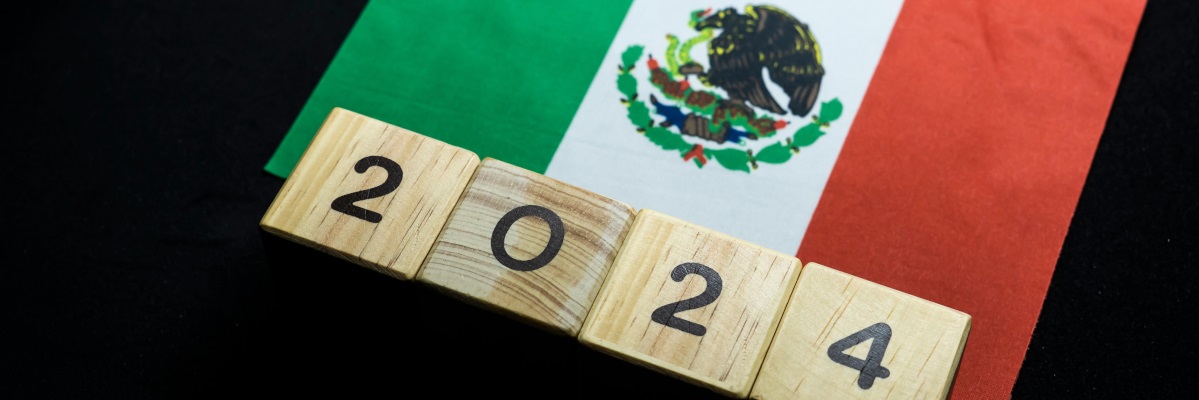Diplomacy
Lopez Obrador's popular support, a key factor in determining who will be Mexico's first female president

Image Source : Shutterstock
Subscribe to our weekly newsletters for free
If you want to subscribe to World & New World Newsletter, please enter
your e-mail
Diplomacy

Image Source : Shutterstock
First Published in: Jan.07,2024
Apr.26, 2024
Next June 2nd, Mexicans have an historical appointment with the ballot boxes. From them will almost certainly emerge the country’s first female president. The two contenders represent divergent models. The incumbent, embodied by Claudia Sheinbaum, inherits a version that, in the name of the greater wealth redistribution, concentrated all power in the figure of President Andrés Manuel López Obrador and his party, Morena. The alternative is offered by a coalition of opposition parties. They and their presidential candidate, Xóchitl Gálvez, advocate for the need to respect certain institutional checks and balances. But the credibility of those organizations, who governed between 2000 and 2018, and likely of the electoral democracy model they represent, is seriously questioned. Amidst this context, the high and persistent approval of López Obrador may offer revealing, though not definitive, clues. The latest report from Oraculus, a poll aggregator, recorded that 68% of Mexican citizens approve President López Obrador's management, while only 29% disapprove. The portal regularly processes results from more than a dozen of the main polling firms. Specifically, the survey conducted by ‘El Financiero’ (newspaper) in December 2023 showed the smallest difference between the approval (55%) and disapproval (44%) of the president by citizens, which nonetheless was eleven percentage points.
For five years, the approval rating of the Mexican president has managed to avoid steep declines. As the electoral campaign kicks off, all signs indicate that it will continue to be stable and positive. Unfortunately, analysts underestimate the impact that such a situation may have on the outcome of the upcoming presidential election. This stance is associated with three powerful myths. Myth 1: approving is one thing, voting is another. The president’s popularity matters little for the outcome of the presidential election. This myth blatantly ignores an essential reference. Thirty years ago, the political scientist Fabián Echegaray was the pioneer in revealing that the popularity of Latin American leaders is the best predictor of the result that the ruling party candidate will obtain in the election. Approving and voting are two different acts, but there tends to be a strong positive link between them. It would be puzzling for democracy if citizens regularly rejected at the polls governments whose performance they approve of in public opinion polls. The Latin American comparative experience shows that between 1982 and 2023, a total of thirty-five leaders from fourteen countries in the region, whose elections took place in a free and transparent environment, reached the months prior to the start of the electoral campaign with positive approval ratings. In twenty-seven cases (77.14%), there was a generous and sufficient transfer from the popularity of the current executive to the vote count of the official party’s presidential candidate. Forewarned is forearmed. The positive approval of the incumbent tends to consistently anticipate the continuity of the ruling party in power.
Only in eight cases did this trend not materialize. The first record, dates back to 1990 in the presidential elections of Costa Rica. The last dated in 2020 during the elections in the Dominican Republic. In all those electoral processes, the government’s presidential candidate seemed bolstered by the high approval rating of the incumbent leader. However, they were defeated at the polls. The common feature in practically all cases was that the party in power faced the campaign affected by a strong process of internal division. This fact dispersed the pro-government vote, a scenario that ended up benefiting the opposition. That’s not the current situation of the ruling party in Mexico, Morena. Until recently, the organization faced the possibility of a traumatic rupture when former Chancellor Marcelo Ebrard did not recognize the results of the internal electoral process, challenged them, and even threatened to leave the party along with a legion of sympathizers. But the threat of a rupture dissipated when Ebrard finally backed down. The opposition never properly gauged the true depth of a potential internal split in Morena led by the former Chancellor. Although the episode could end up being the only serious threat to the current purpose of retaining the reins of power.
Myth 2: the theory of presidential popularity transfer does not apply in Mexico.There is a belief that while the theory of presidential popularity transfer may apply in other regions, it does not do so in the case of Mexico. The assumptions in favor would be as follows: 1. Heading into the 2000 presidential elections, PRI President Ernesto Zedillo had an approval rating of 65%. However, the current presidential candidate, Francisco Labastida was defeated by the ‘Partido Acción Nacional’ (PAN) candidate, Vicente Fox. 2. Similarly, prior to the 2012 presidential elections, Felipe Calderón had a 60% approval rating, but it didn’t end up benefiting the current candidate, Josefina Vázquez Mota, who relegated to third place in the race.
While most Latin American countries have held an average of approximately seven presidential elections since their transition, Mexico has only had three following the political alternation in 2000: the elections of 2006, 2012 and 2018. With so few cases, the emergence of a trend is always in its infancy. This is especially true if one of the three cases, the 2012 elections, indeed constituted an anomaly. The high approval rating of President Calderón did not translate into votes for the current presidential candidate. Indeed, the 2012 elections constitute one of the regional cases we previously highlighted as exceptions. However, there is sufficient evidence accumulated regarding the fact that during the 2012 electoral process, the PAN experienced an underlying internal division that decisively affected its chances of winning. Even with the exception, the trend for presidential approval to reflect in the electoral outcome has been predominant in Mexico (66.66%). After the 2024 elections, it is very likely to experience an increase that brings it very close to the Latin American average rate (82.14%). One of the criteria guiding the selection of cases in research on presidential popularity is that presidential elections have been held after the democratic transition. By definition, authoritarian regimes do not guarantee an autonomous public opinion and tend to have elections that are not free and transparent. In that sense, the popularity of President Ernest Zedillo cannot be considered a reliable indicator. It is a “citizen perception” reported within an authoritarian regime. An environment where fear, censorship, persecution, and retaliation prevail. Sartori (1992) insisted on the obligation to differentiate between “opinion in the public” and “opinion of the public”.
Myth 3: the outcome of the presidential election is decided during the campaignThe role of elections as a mechanism for the peaceful selection of political leaders has fostered the belief that the campaign always represents a decisive moment in shaping electoral preferences. This explains the journalistic reports about a potential campaign in which a stiff incumbent candidate, Claudia Sheinbaum, is cornered by the rhetorical skills and charisma of the opposition candidate Xóchitl Gálvez, and by the impact of the negatives associated with the performance of the incumbent ruler. In reality, the campaigns have a very limited effect on the electoral outcome, they only matter under very specific conditions. Most of the time, they only reinforce the decision that voters made before the start of the campaign itself.
However, despite the abundant empirical evidence, it would be a mistake to take for granted a victory for Morena in the 2024 presidential elections. The relevant thing is just to acknowledge that the outcome seems to favor Morena. Political events resist being confined to a framework. They have the potential for surprise and innovation. Political actors have memory, learn from experience, and often show ingenuity. Under certain conditions, these attributes lead them to reverse the expected historical outcome. Once social science is able to reveal certain patterns of behavior, the next challenge is to infer whether in a new experience the norm or the exception will ultimately prevail. The dilemma between pattern and plasticity. Pattern marks regularity, the behavior that, by dint of repetition, is expected. Meanwhile, plasticity means assuming that there will always be exceptions to any regularity or generalization we may reach, in principle.
First published in :

PhD in Political Science. Member of the National System of Researchers of Mexico (SNI) Level 1. Line of research: "Presidential approval and alternation in power in Latin America". He teaches Comparative Political Systems, Political Science III, Political Analysis and Politics and Government in Latin America. Served as a political analyst in the Jalisco newspaper El Informador (2010-2014). Creator of the political analysis blog "Certezas de la Incertidumbre" (Certainties of Uncertainty) active since 2009 www.orestesenrique.wordpress.com
Unlock articles by signing up or logging in.
Become a member for unrestricted reading!